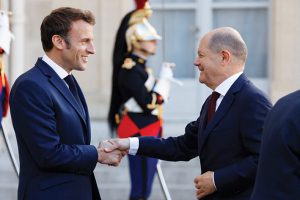German Chancellor Olaf Scholz and French President Emmanuel Macron met in Paris Wednesday to try and iron out wide-ranging tensions from energy and economic issues to the future of European defense.
A Macron aide said the two leaders were set to discuss defense, macroeconomic issues and energy over a working lunch at the presidential palace. They had no plans for a news conference after their encounter.
Europe’s two biggest economies have traditionally been the driving force behind key decisions in the European Union including a massive plan to raise billions of euros in joint debt to weather the Covid pandemic.
But the Franco-German engine appears to have jammed up, potentially delaying decision-making just as the EU grapples with acute challenges from the Russia’s war in Ukraine to soaring energy prices.
In Paris, Scholz was seeking to develop a joint French and European strategy to counter the impact of the US Inflation Reduction Act, officials said. German Economics Minister Robert Habeck has said the act risks triggering transatlantic trade tensions given large subsidies to attract companies investing in the US renewables sector.
Scholz is also seeking to discuss with France a European solution to the energy crisis. With half of France’s nuclear power plants down, Germany is forced to export electricity across the border from renewable sources at a time when the country is scrambling to secure new supplies.
Gas Bills
Money is part of the problem. When Berlin unveiled a plan to spend 200 billion euros ($201 billion) to help households and business pay their gas bills last month, European partners including France complained that the scheme could divide the region further.
Paris and Berlin canceled a joint meeting of government ministers that had been scheduled for Wednesday, to replace it with the Scholz visit and the lunch at the Elysee Palace.
The decision came after Berlin agreed to build a missile defense shield dubbed the “European Sky Shield Initiative†with other members of the NATO military alliance, that could include German, US and Israeli-made equipment.
The project is a blow for France, which has been developing a ground-to-air defense system with Italy known as Mamba.
Work Ahead
On the sidelines of a meeting of EU leaders last week, Macron said the joint ministerial gathering had been canceled because German ministers were not available, although he insisted on the significant amount of work ahead for the two partners.
The next meeting, which is mostly symbolic, is planned in January for the 60th anniversary of the Elysee treaty, a treaty of friendship signed between leaders Charles de Gaulle and Konrad Adenauer to end years of Franco-German enmity, and which called for regular meetings between the two.
The missile shield isn’t the only thorn in the relationship, especially in the defense sector. Like his predecessors, Macron argues that Europe should rely on its own defense systems to be independent of the US.
Transatlantic Relationship
In Paris, officials have privately warned that President Donald Trump, or a figure with similar doubts on the need for a strong transatlantic relationship, could come back to power. They emphasize the need for stronger EU autonomy in defense.
But France, which has Europe’s biggest and strongest defense industry with giants such as Dassault Aviation or Thales SA, is often suspected of pushing its own economic interests when it promotes “strategic sovereignty.â€
Officials in Paris have privately complained that Germany is working with the US’s SpaceX to launch satellites rather than relying on the European launcher, Ariane, and that it bought F-25 fighter jets from Lockheed Martin.
—Bloomberg
 The Gulf Time Newspaper One of the finest business newspapers in the UAE brought to you by our professional writers and editors.
The Gulf Time Newspaper One of the finest business newspapers in the UAE brought to you by our professional writers and editors.
